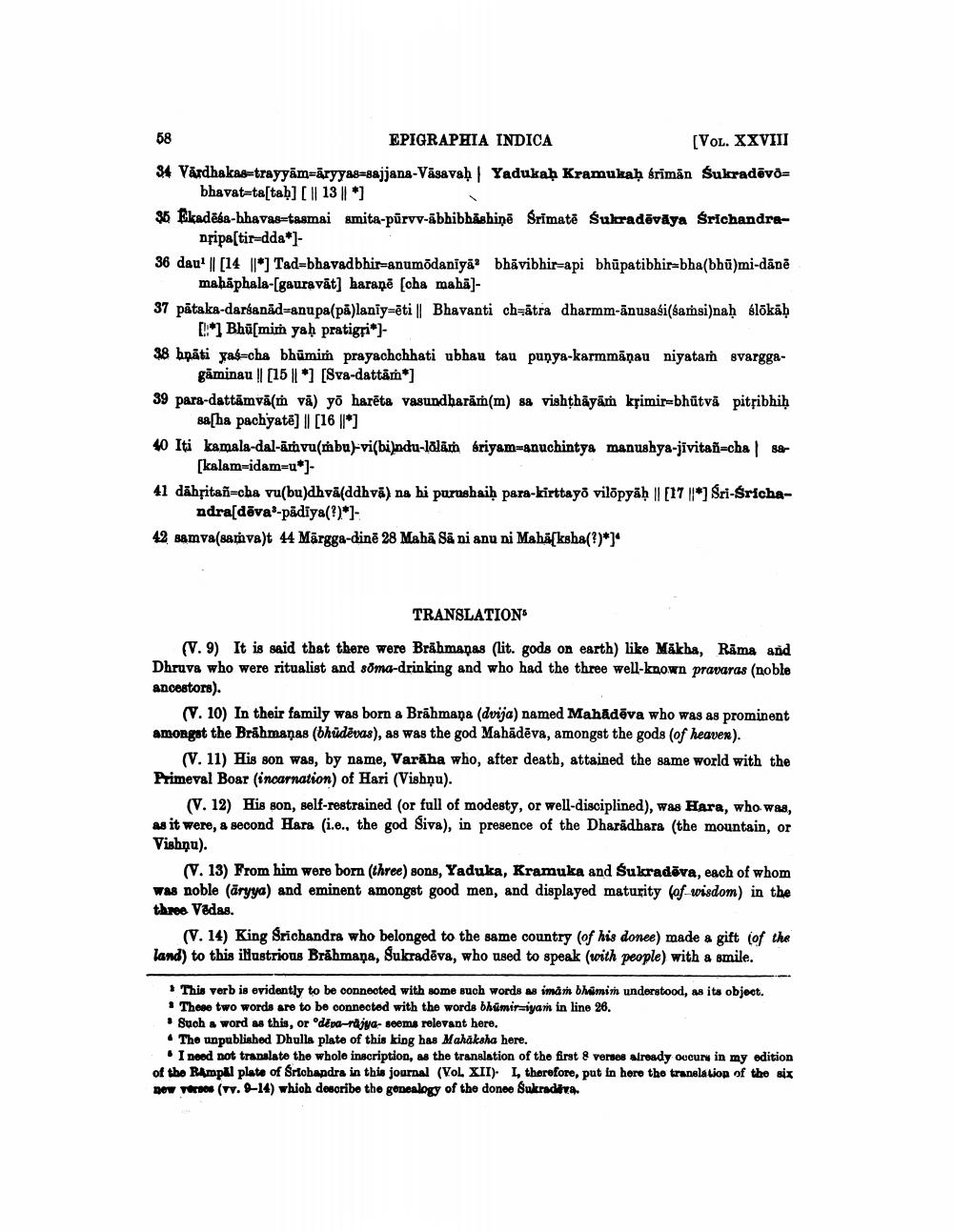________________
EPIGRAPHIA INDICA
(VOL. XXVIII
34 Vārdhakas-trayyām=āryyas=sajjana-Väsavaḥ| Yadukaḥ Kramukah sriman Sukradēvô=
bhavat=ta[tab] [ || 13 |*] 36 Ekadēša-bhavas-tasmai smita-pūrvv-abhibhäshiņā Srimatë sukradāvāya Srichandra
nțipastir-dda*]36 dau' || [14 ||*] Tad=bhavadbhir-anumödaniya bhāvibhir=api bhūpatibhir=bha(bhū)mi-dānē
mahāphala-(gauravāt] haraņē (cha mahā)37 pātaka-darsanād=anupa(pā)laniy=ēti || Bhavanti ch=ātra dharmm-ānusasi(samsi)naḥ slökāḥ
C:*) Bhū[mim yaḥ pratigri*)38 hpāti yas-cha bhūmiṁ prayachchhati ubhau tau punya-karmmānau niyatam svargga
gāminau ! (15 | *] [Sva-dattame] 39 para-dattāmvā(m vā) yo harēta vasundharām(m) sa vishthāyām krimir-bhūtvā pitsibhiḥ
sa[ha pachyatē] || [16 [*] 40 Iti kamala-dal-amvumbu)-vi(bilndu-lolām briyam=anuchintya manushya-jīvitañ-chal sa
[kalam=idam=u*]41 dāhritañ-cha vu(bu)dhvä(ddhvă) na hi purushaih para-kirttayo vilõpyāḥ || [17 ||*] Sri-Áricha
ndra[dāva-padiya(?)*142 samvadamva)t 44 Mārgga-dinē 28 Mahā Sā ni anu ni Mahä[ksha(?)***
TRANSLATION (1.9) It is said that there were Brāhmaṇas (lit. gods on earth) like Mäkba, Rāma and Dhruva who were ritualist and soma-drinking and who had the three well-known pravaras (noble ancestors).
(V. 10) In their family was born a Brāhmaṇa (dvija) named Mahādēva who was as prominent amongst the Brāhmaṇas (bhüdēvas), as was the god Mahādēva, amongst the gods (of heaven).
(V. 11) His son was, by name, Varāha who, after death, attained the same world with the Primeval Boar incarnation) of Hari (Vishnu).
(V. 12) His son, self-restrained (or full of modesty, or well-disciplined), was Hara, who was, w it were, a second Hara (i.e., the god Siva), in presence of the Dharadhara (the mountain, or Vishnu).
(V. 13) From him were born (three) sons, Yaduka, Kramuka and Sukradāva, each of whom was noble (äryya) and eminent amongst good men, and displayed maturity (of wisdom) in the three Vedas.
(V. 14) King Srichandra who belonged to the same country of his donee) made a gift of the land) to this illustrious Brāhmaṇa, Sukradēva, who used to speak (with people) with a smile.
This verb is evidently to be connected with some such words as imam bimir understood, as its object. . These two words are to be connected with the words bhumir-iyam in line 26. • Such a word as this, or depa-rajya- seems relevant here. • The unpublished Dhulla plate of this king has Mahāksha here
.I need not translate the wholo inscription, as the translation of the first & verses already occur in my edition of the Rampal plate of Srlobandra in this journal (VoL XII). I, therefore, put in here the translation of the six new roos (vv. 9-14) which describe the genealogy of the donee Sukradera.




